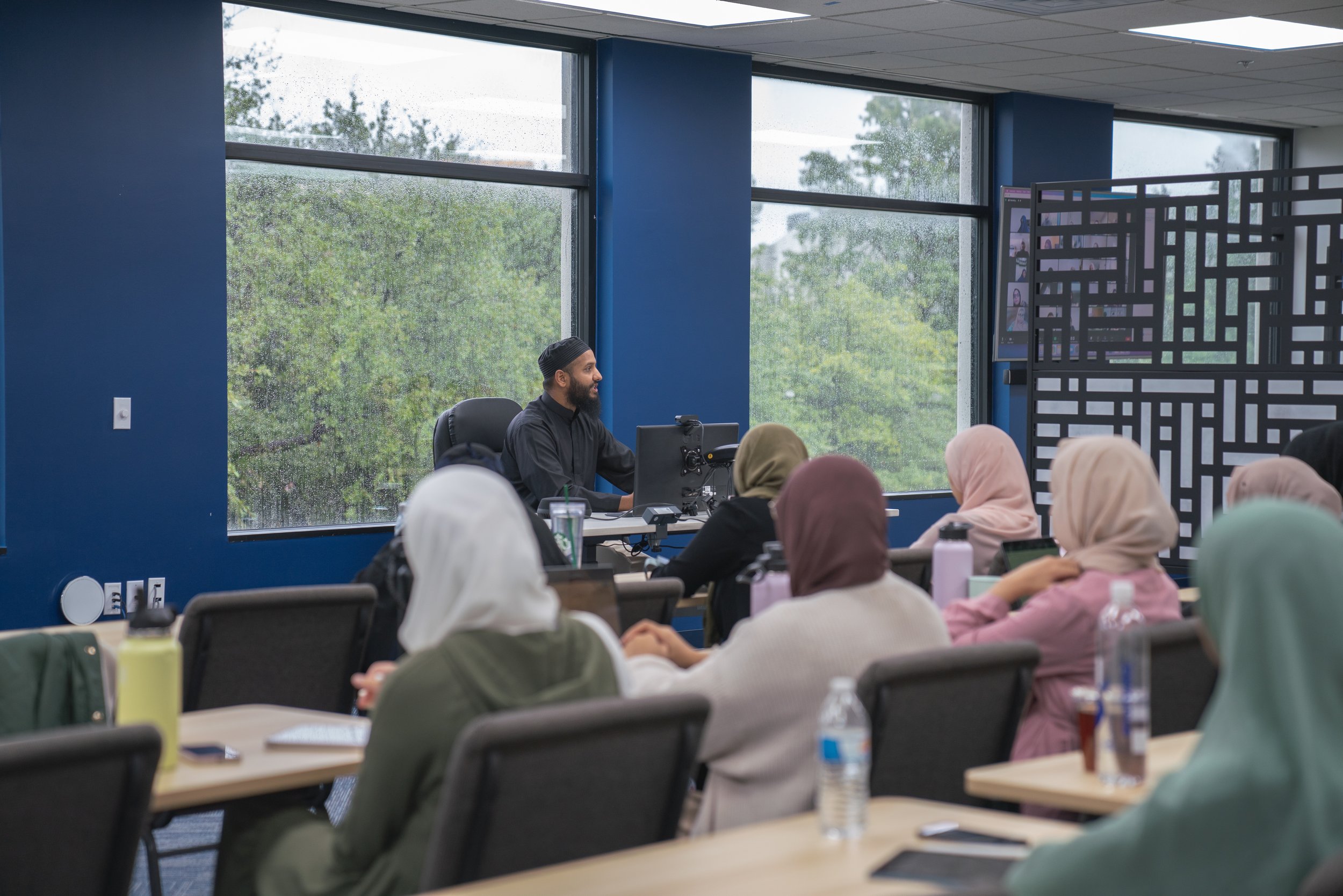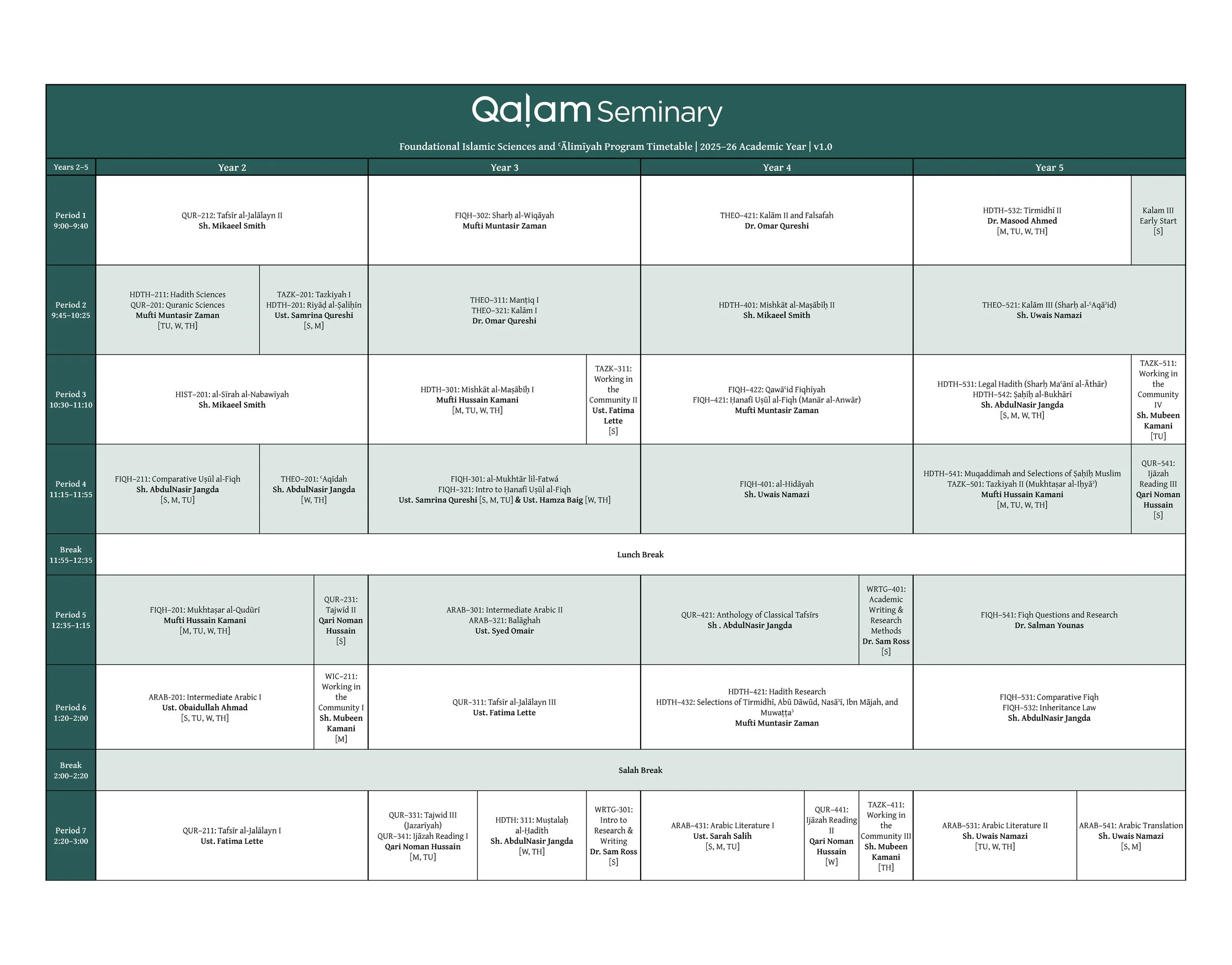
Year 2 - Foundational Islamic Sciences
Begin Your Journey
The Qalam Seminary's Year 2 program provides students with a strong foundation and comprehensive understanding of the major Islamic Sciences. Students develop the ability to read and benefit from classical Arabic works on Islamic law, theology, Quranic exegesis, Hadith, sīrah, and tazkiyah. Our curriculum and pedagogy is rooted in tradition while also preparing students for the modern context. The Year 2 program is a strategic exit point in the five-year Seminary program that equips the community leader and activist with the tools and knowledge required to serve in a meaningful capacity.
What Will Graduates Accomplish?
Graduates will be prepared to:
Pursue advanced Islamic studies.
Serve their communities as educators, youth directors, or assistant Imams.
Teach classes and workshops on the Foundational Islamic Sciences in their local communities.
Deliver effective Khutbahs.
Produce Islamic educational material.
Provide Islamic education at Islamic schools.
Part-Time and Remote Options
We understand that not every interested and motivated student will be able to commit to a five-year program full-time. As such, we offer a part-time option for Year 2 and up. Students can enroll in individual subjects working towards the completion of the Foundational Islamic Sciences year. Part-time students often take two to three years to complete all six mandatory periods. Accepted students meet with academic advisors to determine the most suitable part-time option.
The Qalam Seminary also offers a remote learning track for all years. Students attend classes live via Zoom and complete all the same class assignments. Instructors and Teaching Assistants are accessible via online office hours.
Year 2 Course Catalog, 2024–25
Aside from minor modifications, the course catalog remains the same every year.
-
Course Title: QUR–201: ʿUlūm al-Qurʾān (Introduction to the Sciences of the Qur’an)
Instructor: Mufti Muntasir Zaman
Texts: Mukhtaṣar Itqān ʻUlūm al-Qurʼān
Course Description: This course is designed to provide students with an understanding of the profound aspects of the Quran. Students explore the Quran's depth: revelation, miraculous nature, preservation, and interpretation methods (tafsīr). By studying its compilation, scholarship, and contemporary discussions, students gain appreciation for the Quran, understand approaches to tafsīr, and develop critical analysis skills.
-
Course Title: QUR–211: Tafsīr al-Jalālayn I (Scholarly Analysis of the Qurʾān)
Instructors: Ustadha Fatima Lette
Text: Tafsīr al-Jalālayn (Juzʾ 11–20)
Course Description: In this course, students will be introduced to the science of tafsīr through the study of a traditional commentary of the Quran, Tafsīr al-Jalālayn. The objective of the class is for students to gain the ability to translate the verses of the Qur’ān, fluently translate the commentary, and develop a connection to the Quran by reflecting and relating it to their personal lives.
-
Course Title: QUR–212: Tafsīr al-Jalālayn II (Scholarly Analysis of the Qurʾān)
Instructors: Shaykh Mikaeel Smith
Text: Tafsīr al-Jalālayn (Juzʾ 21–30)
Course Description: In this course, students will be introduced to the science of tafsīr through the study of a traditional commentary of the Quran, Tafsīr al-Jalālayn. The objective of the class is for students to gain the ability to translate the verses of the Qur’ān, fluently translate the commentary, and develop a connection to the Quran by reflecting and relating it to their personal lives.
-
Course Title: QUR–231: Tajwīd II
Instructors: Qari Noman Hussain
Text: Tuḥfat al-Aṭfāl: Sharh of Qari Saleem Gaibie
Course Description: This course offers a comprehensive exploration of the science of Tajwīd, including its technical, philosophical, and ethical dimensions. Students will cover articulation points, attributes, and rules of Tajwīd, culminating in a deep understanding and proficiency in order to advance to further certification courses in the sciences.
-
Course Title: TAZK–201: Tazkiyah I (Spiritual Development)
Instructor: Ustadha Samrina Qureshi
Texts: Ayyuhā al-Walad by Imam al-Ghazālī, Taʿlīm al-Mutaʿallim by Imam al-Zarnūjī
Course Description: Students will engage with a pinnacle text by Imam al-Ghazālī which will equip them with strategies for self-reflection, character development, and strengthening their connection with Allah, especially in the context of being a student of sacred knowledge. The objective is for students to understand the tools in order to refine their character and remain grounded in their relationship with Allah, despite the many obstacles they may face on their journey of sacred knowledge.
-
Course Title: HDTH-201: Riyāḍ al-Ṣāliḥīn
Instructor: Ustadha Samrina Qureshi
Texts: Mukhtasar Riyāḍ al-Ṣaliḥīn
Course Description: Riyāḍ al-Ṣaliḥīn (The Gardens of the Righteous) is a study of Prophetic wisdom on a variety of topics, from core beliefs and intentions to practical everyday etiquette. Students will study this collection from a tazkiyah lens with guided reflections and practical application to their journey of sacred studies. Along with spiritual refinement, students will also expand their vocabulary of hadith as well as build the skill of memorizing important narrations. -
Course Title: HDTH–211: ʿUlūm al-Ḥadīth (Introduction to the Sciences of Hadith)
Instructor: Mufti Muntasir Zaman
Texts: Introduction to the Hadith Sciences (by the instructor, forthcoming); Nukhbah al-Fikar
Course Description: In this course, students will study the primary discourses surrounding the science of hadith: its history, preservation, literature, and modern debates in the form of lectures and assigned readings from relevant resources. The semester will conclude with a reading of Ibn Ḥajar's Nukhbah al-Fikar to cover an overview of key nomenclature (muṣṭalaḥ).
-
Course Title: HIST–201: Al-Sīrah al-Nabawīyah (The Prophetic Biography)
Instructor: Shaykh Mikaeel Smith
Text: Sīrah Reader based on Al-Luʼluʼ al-Maknūn fī Sīrat al-Nabī
Course Description: In this course, students will be guided through a complete survey of the Prophetic biography through selected passages of classical sīrah texts presented through an engaging, lecture format. Students will be presented with multiple perspectives and accounts of the Prophet’s life in a manner that relates to the modern context, focusing on the practical implications of the Prophetic life in our current times.
-
Course Description: FIQH–201: Mukhtaṣar al-Qudūrī (Islamic Jurisprudence)
Instructor: Mufti Hussain Kamani
Text: Mukhtaṣar al-Qudūrī
Course Description: In this course, students will embark on an in-depth exploration of legal rulings within the Hanafi school of thought, focusing on the renowned treatise authored by Imam Al-Qudūrī. This course is designed to provide students with a comprehensive understanding of the Hanafi legal methodology and its practical applications across a range of devotional and transactional matters. By delving into the intricacies of Imam Al-Qudūrī's treatise, students will gain insights into the principles, methods, and nuances that govern the practice of Islamic law within the Hanafi tradition.
-
Course Description: FIQH–211: Comparative Uṣūl al-Fiqh (Principles of Islamic Jurisprudence)
Instructor: Shaykh AbdulNasir Jangda
Text: Al-Wajīz fī Uṣūl al-Fiqh by Wahbah al-Zuḥaylī
Course Description: In this course, students will develop a comprehensive understanding of the methodologies employed by Muslim jurists in the interpretation and application of Islamic law. Through a rigorous exploration of theoretical principles and practical implications, students will develop the skills necessary to navigate the sources of Islamic law and apply its teachings in the modern context. By the end of this course, students will possess a strong foundation in Islamic jurisprudential methodologies and the practical skills needed to engage with and apply Islamic law in the contemporary world, while also being sensitive to ethical considerations and cultural nuances.
-
Course Title: THEO–201: ʿAqīdah (Doctrines of Faith)
Instructor: Shaykh AbdulNasir Jangda
Text: Al-ʿAqīdah al-Ṭaḥāwīyah
Course Description: This course will provide students with the historical and spiritual background of this science and introduce students to the principles of Islamic belief from a theoretical and applied perspective. Upon completing the course, students will have gained a deep understanding of the theological underpinnings of the Islamic tradition. By engaging with the rich history, textual sources, logical arguments, and spiritual dimensions of belief, students will be equipped to contribute meaningfully to discussions within the context of ʿaqīdah and broader Islamic intellectual discourse.
-
Course Title: ARAB–201: Intermediate Arabic I
Instructor: Ustadh Obaidullah Ahmad
Text: ʿIlm al-Ṣīghah & Al-Mumtiʿ
Course Description: In this course, students will cover an overview of fundamental concepts of naḥw (syntax), ṣarf (morphology) and tarkīb. The objective of the course is to reinforce a student’s understanding of basic Arabic grammar and morphology principles.



